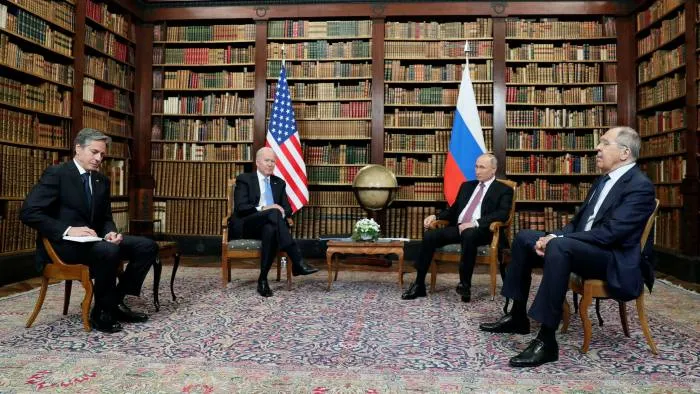
US president Joe Biden and his Russian counterpart Vladimir Putin may have left Geneva with a sense of a job well done. The summit between two countries, beset by mutual distrust, passed without major disagreement and a significant list of areas of co-operation was agreed.
But fleshing out the details and making tangible progress will be far harder, Russia is cautioning.
“This is a challenge for higher diplomatic mathematics,” Russia’s deputy foreign minister Sergei Ryabkov remarked. “In this matter, of course it is important to show not only political will, but also a creative approach.”
Putin and Biden agreed at Wednesday’s summit to restart talks on arms control, establish bilateral discussions on cyber security and explore the potential of exchanging citizens held in each other’s prisons. Both sides have failed to make progress in these areas in the past.
“There is no complete match,” Ryabkov said in an interview published by the foreign ministry on Thursday. “If this were so, then by and large it would mean that all agreements have already been reached.”
“On the contrary, we have the impression that the American approach contains very different constants than ours. Combining these approaches, these two formulas, will be a daunting task,” he said with reference to arms control talks, adding that added consultations could begin “within weeks”.
The US withdrew from the Intermediate-Range Nuclear Forces (INF) treaty — which banned land-based missiles with a range between 500-5,500km — under president Donald Trump and has resisted talks on a replacement deal that does not include China.
Washington has meanwhile accused Russia of ordering, supporting or abetting cyber attacks on US companies, government departments and infrastructure. Moscow rejects those claims and says it is also a constant victim of hacking attempts.
And while Putin and Biden affirmed there would be continued dialogue between their militaries in Syria, they are still in direct opposition over Moscow’s support for Belarusian dictator Alexander Lukashenko and the ongoing conflict in Ukraine.
Biden said the test would be whether talks progressed over the next three to six months, but injected his own note of scepticism about the task ahead to reporters after the summit: “When did I say I was confident?”
Their separate press conferences allowed both leaders to proffer professional compliments to each other while reiterating longstanding complaints.
Biden condemned Russia’s treatment of opposition activist Alexei Navalny and warned of “devastating consequences” for Moscow if he were to die in jail, and also criticised the harassment of foreign media outlets by the Kremlin.
Putin, speaking before, compared Navalny’s incarceration to those prosecuted for taking part in the January riot at the US Capitol, and cited the US detention facility at Guantánamo Bay to accuse Biden of hypocrisy on human rights.
But the overall attitude from both suggested the talks had at least paused the spiralling descent of relations between the two countries to a post cold war nadir.
“We warned against having any excessive expectations for this summit from the beginning. But we can say now, first and foremost, based on the opinion of the president himself, that it can be described as rather positive,” Putin’s spokesman Dmitry Peskov said on Thursday morning.
“The two leaders had the chance to directly present their stances and to understand more or less clearly where interaction is possible and where there can be no interaction for now due to categorical disagreements.”
In a step that should help both sides turn the presidential agreements into tangible outcomes, ambassadors from each country are expected to return to their posts in the next few days, after months of absence following decisions to return them home for consultations.
But Peskov cautioned against rapid progress. There were no concrete agreements made on cyber security, he said, and “no deadline” for a possible prisoner exchange.
“There are framework discussions at the state level, and then very, very difficult work will begin,” he said, referring to exchanging prisoners. “You need to sit down and talk at the working level. Indeed, it is the same for all the other issues.”
A senior Biden administration official, saying the aim of the summit was to inject stability and predictability into the relationship, also kept expectations low.
“[W]e’re not flipping a light switch,” the official told reporters after the summit. “This is going to be an ongoing process and the ultimate test is whether there are practical results.”




















